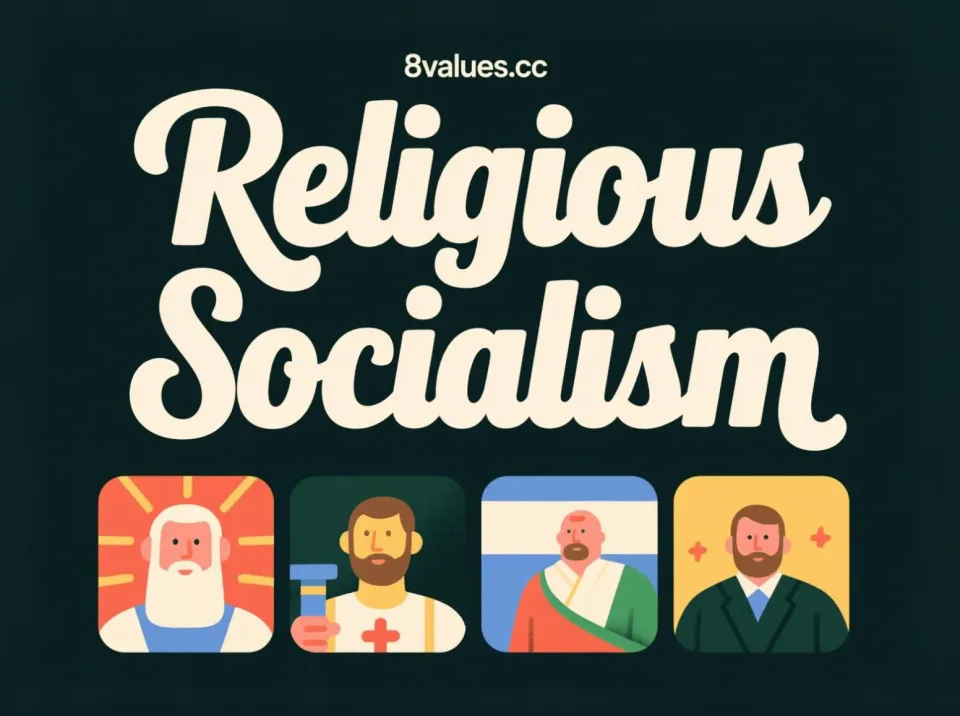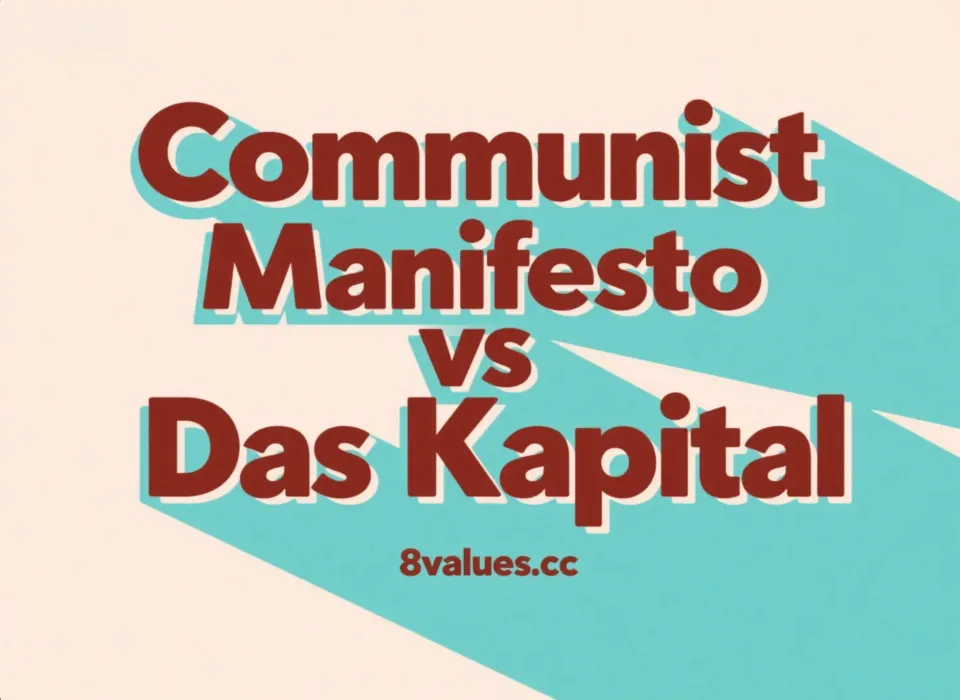Religious Socialism | 8values Interpretation of ideological ideology in political tests
Deeply explore Religious Socialism, a political trend that integrates religious values and socialist concepts. Understand its historical origins, core principles, main forms (such as Christian socialism, Islamic socialism), and similarities and differences with capitalism and Marxism, and explore its impact and challenges on modern society. Explore your political tendencies now with the 8values political tendency test and see a detailed introduction to all 8values results ideology.
Religious Socialism is a political and social trend that combines religious beliefs with socialist concepts. It emphasizes the promotion of social justice, equality and collective well-being through religious values. This idea is often based on an interpretation of specific religious doctrines, emphasizing caring for the weak, oppression and injustice, and promoting a spirit of mutual assistance in the community. Religious socialists believe that religion is not only a personal spiritual sustenance, but also a powerful driving force for social change.
The core concept and moral foundation of religious socialism
The core of religious socialism lies in the close integration of religious ethical principles (such as love, justice, compassion, compassion, mutual assistance) with socialist economic and social goals (such as wealth redistribution, elimination of class differences, common welfare). It believes that many religions contain doctrines that emphasize equality, compassion and the spirit of community that are in line with socialism’s pursuit of social equity and economic equality. Unlike neoliberals, religious socialists believe that there is an alternative based on the ideal of democratic socialism, aimed at promoting workers’ rights, minority rights and human rights, and for wider opportunities for democratic and popular participation.
Religious values and social actions
The advocates of religious socialism combine this idea with the struggle for the rights of all and the protection of divine creations, starting from the inalienable and sacred dignity of each individual. They believe that as people of faith, it is a duty to fight religious fundamentalism and oppose religion as a political tool. This trend of thought is committed to striving for tolerance of religious diversity and social and economic equality on a global scale, working to eliminate poverty and overcome social, cultural and economic divides.
On the practical level, religious socialism advocates:
- Distribution of power : Power should be used to promote the growth and development of individuals and communities, educate people, heal pain, rather than maintaining privileges or inflicting harm.
- Social Care : Individuals and collectives must “feed the hungry, wear warm naked, settle the homeless, treat patients, educate young people, and take care of the helpless.”
- Spiritual and Community : Spiritual renewal should benefit the entire society, individuals and families, because the completeness can only be found in the community.
- Truth and Justice : All actions must be rooted in respect for truth and justice.
Historical development and school of religious socialism
As an ideological system, its formal rise is closely related to the social inequality and capitalist exploitation brought about by the industrial revolution in the 19th century. However, its roots can be traced back to the emphasis on sharing and mutual assistance in earlier religious traditions.
Early origins and germination of thoughts
Before the formal concept of socialist philosophy emerged, many religious practices and ideas contained elements similar to socialism.
- The Old Testament : contains instructions on social justice and generosity to the poor, such as the emphasis in Deuteronomy and Psalm singular justice for the poor.
- New Testament : Jesus’ teachings are often described as having socialist tendencies, especially the statement that Jesus equates himself with the hungry, the poor, the sick and the prisoners, is regarded as the cornerstone of Christian socialism. In the early Jerusalem churches practiced property ownership, and no one claimed that any property was owned. This model was taken seriously for centuries and became an important factor in the rise of feudal systems, and later continued only in monasteries.
- Godfather’s Time : Basil of Caesarea condemns the rich who make profits and indifference, and John Crissom criticizes the rich who abuse their wealth.
- Early Modern : The 16th-century Huts believed in strict biblical principles and church discipline, implemented the common ownership of almost all property, and were regarded by Friedrich Engels as a "primitive communist." The 16th-century British writer Thomas More portrayed a society based on shared ownership of property in Utopia. The "Diggers" during the British Civil War also proposed political and economic theories similar to the branches of modern socialism, especially anarchism and communism.
Evolution from the 19th century to the present
With the advent of the Industrial Revolution, the social structure underwent drastic changes, and socialism emerged as a moral response to capitalist inequality.
- Christian Socialism : In 19th-century Britain, thinkers such as FD Maurice and Charles Kingsley first proposed the term "Christian socialism", who advocated the application of Christian ethical principles to modern industrial life and against social injustice. The Fabian Society, founded in 1884, also had an important influence on the early history of the British Labor Party. In the United States, the Social Gospel movement combines Christian doctrine with the plight of the working class. Keir Hardie, one of the founders of the British Labor Party, claimed that his socialist ideas originated from the New Testament. The Liberation Theological Movement emerged in Latin America in the 1960s, emphasizing the fight against poverty and oppression through the Christian faith.
- Islamic Socialism : Apply the principles of mutual assistance and poverty alleviation in Islamic teachings (such as "Zakat") to economic and social policies, opposing exploitation and greed. The welfare state of Medina established by the Prophet Muhammad is regarded as its source of inspiration.
- Buddhist Socialism : advocates the principle of compassion, non-violence and ending suffering in Buddhism, opposes the gap between the rich and the poor and social injustice, and emphasizes social harmony and common welfare. The 14th Dalai Lama once publicly stated that he was "half Marxist and half Buddhist", believing that the Marxist economic system is based on moral principles.
- Jewish Socialism : In the Jewish communities in Eastern Europe and the United States, Jewish socialism combines the ethical traditions of Judaism (such as "repairing the world" Tikkun Olam) with socialist ideas to form organizations such as the "Jewish Workers' Union" (Bund). Jews have long supported the movements advocated by socialism, such as feminism, anti-racism and workers' rights.
The dialogue between religious socialism and secular thought
While pursuing social change, religious socialism also seeks its own positioning between atheistic or anti-religious Marxism and capitalism that over-represents personal wealth.
Criticism of capitalism
Religious socialism generally criticizes capitalist greed and inequality and advocates the fair distribution of economic resources. It argues that capitalism has caused people to lose their dignity to live together and lead to social division. This critique stems from the emphasis on human dignity and common well-being by religious doctrine, which believes that capitalism simplifies human values into economic units, thus creating spiritual poverty.
Similarities and similarities with Marxism
Karl Marx once pointed out that "religion is the opium of the people", but the complete expression of his sentence is: "religion is the sigh of oppressed creatures, the feelings of the ruthless world, and the spirit without spiritual conditions." Marx diagnosed religion as a symptom and response to suffering, believing that the problem was not people seeking transcendent meaning, but capitalism forced them to seek this meaning outside of material life.
Despite this common criticism, there are essential differences between religious socialism and Marxism in terms of theoretical basis and practical path.
- Worldview basis : Religious socialism is based on idealism and recognizes the role of supernatural forces (such as God) in social change. Marxism, on the basis of dialectical materialism and historical materialism, negates supernatural forces and emphasizes the objective laws of social development.
- Value Objective : Religious socialism pursues the realization of social justice through moral education, such as opposing materialism and militarism, and advocating a mutually aided life. Communism achieves the liberation of the proletariat and the common happiness of all mankind through class struggle and production practice.
- Practice Path : Religious socialism tends to promote social reform through peaceful means such as religious organizations, education and community organizations. Communism usually promotes social change through proletarian parties and revolutionary practices.
Catholicism’s complex attitude towards religious socialism
Historically, the Catholic Church has been critical of socialism (especially its atheistic and materialist variants), but has a more subtle stance on religious socialism.
- Pope's condemnation : Pope Pius IX, Leo XIII, Pius XIX, Benedict XV, Pius XIXIX, Pius XIII, and John Paul II have all condemned communism and socialism. Pius XI clearly stated in 1931: "Religious socialism and Christian socialism are contradictory terms; no one can be a good Catholic and a real socialist at the same time."
- Identity to social justice : Nevertheless, Leo XIII's "Rerum novarum" and Pius XI's "Forty Years" also strongly criticized unrestricted capitalism, supporting workers' right to organize and obtain minimum wages. Pope Benedict XVI told the Italian Senate in 2004 that democratic socialism is close to Catholic social doctrine in many ways and contributes to the formation of social consciousness.
- Pope Francis' position : Pope Francis is regarded as sympathetic to socialism by some because of his frequent criticism of capitalism and neoliberalism, but he denied that he was a communist, calling it a "misunderstanding." He once said: "Marxist ideology is wrong. But I have met many Marxists in my life who are good people, so I don't feel offended."
Modern Challenges and Future Prospects
In contemporary times, the influence of religious socialism is diversified globally and faces new challenges.
Modern Practice and Interreligious Cooperation
- Liberation Theology : Continue to exert influence in Latin America and beyond, emphasizing “priority to the poor.”
- Progressive Religious Movement : Some modern religious groups continue the spirit of religious socialism by supporting issues of anti-poverty, anti-racism and gender equality.
- Interreligious dialogue : In the context of globalization, socialists from different religious backgrounds have begun to cooperate to jointly address climate change and economic inequality. The Democratic Socialists of the United States (DSA) Committee on Religion and Socialism, whose members have clear multi-faith characteristics, including Christians, Jews, Muslims, Buddhists, Hindus and other traditional believers, are committed to economic justice.
- Ecological socialism : Combining religious respect for nature with socialist environmental protection concepts to deal with global issues such as climate change.
Criticism and inherent challenges
Religious socialism also faces criticism and challenges from all sides:
- Criticism of Secular Socialists : Secular Socialists sometimes criticize religious socialism for being too idealistic or lacking scientific basis. Marxists believe that religion may hinder the revolution because it may be used by the ruling elite to control the masses.
- Principle of separation of church and state : In many modern democratic countries, separation of church and state is a core principle. The implementation of religious socialism at the national level may require a radical change in the national constitution and government structure. If a country chooses one national religion, it may exclude other beliefs, which is contrary to the socialist goal of treating people equally.
- Combination with authoritarian politics : The practice of religious socialism may be combined with authoritarian politics in some regions, especially in developing countries, to strengthen political legitimacy through religious authority, and even become a tool to suppress dissent.
- Internal contradiction : The conservatism of religious doctrines can sometimes conflict with the radical change goals of socialism.
- "Spiritual rather than religion" groups : In contemporary society, more and more people think they are "spiritual beliefs rather than religion", and religious socialism needs to explicitly welcome these groups, linking their spiritual exploration with collective liberation to prevent them from being exploited by reactionary narratives.
Famous figures and organizations of religious socialism
Historically and contemporary, many individuals and groups have identified or practiced the concept of religious socialism.
Famous figures
- Adin Ballou : American Christian non-resistanceist, socialist in the Christian anarchist tradition.
- Francis Bellamy : Pastor of the American Baptist Church, author of "The Oath of Allegiance".
- Tony Benn : British politician, Labour MP.
- FD Maurice : Anglican theologian and one of the founders of Christian socialism.
- Charles Kingsley : British clergy, university professor, novelist and poet, and one of the founders of Christian socialism.
- John Ruskin : British Victorian writer and philosopher whose theory of social justice influenced socialist thought.
- James Connolly : Irish politician and trade unionist, laying the foundation for Christian socialism in Ireland.
- Martin Luther King Jr .: American Baptist pastor, civil rights activist, combining Christian nonviolence principles with the struggle for racial equality and social justice.
- Gustavo Gutiérrez : One of the main representatives of Latin American liberation theology.
- Dorothy Day : American Catholic anarchist transformed Catholic philanthropy into Catholic resistance, connecting individual good deeds with social change.
- Hélder Câmara : Bishop of Brazil, who calls himself socialist, is famous for "when I feed the poor, they call me saints. When I ask why so many people are poor, they call me communists."
- Donald Soper : British Methodist pastor and Labor politician dedicated to helping the poor.
- Hugo Chávez : former Venezuelan president who links socialism with the teachings of Jesus.
- The Dalai Lama (Tenzin Gyatso) : The 14th Dalai Lama claimed to be "half Marxist and half Buddhist."
- António Guterres : Secretary-General of the United Nations, formerly chairman of the Socialist Party International, is a devout Catholic.
Famous groups and organizations
- International League of Religious Socialists (ILRS) : Founded in 1921, it was originally a European organization and later expanded to the world, bringing together religious socialists and believers from various socialist, social democratic and working parties around the world. The organization maintains an observer relationship with Socialist International.
- Labour Party : Many early members were deeply influenced by Christian socialism.
- The Democratic Socialists of America (DSA) Committee on Religion and Socialism: Committed to bringing together socialists from different belief traditions (Christians, Jews, Muslims, Buddhists, Hindus, etc.) to jointly deal with issues such as economic injustice, immigration justice, climate justice, labor rights and LGBTQ+ rights.
Religious socialism is not only a political and economic idea, but also a belief practice deeply rooted in human desire for fairness, dignity and community. It reminds us that the transformation of the material world and the awakening of the spiritual level can work together to build a better and more just future. To gain insight into your political inclinations, try the 8values political inclination test and explore all 8values results ideologies .






